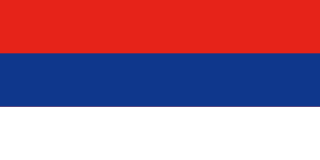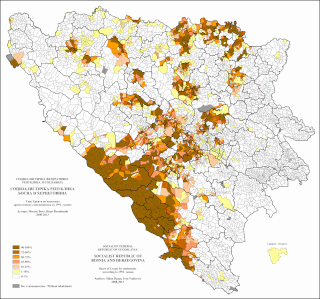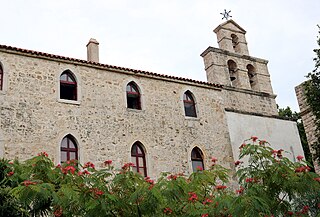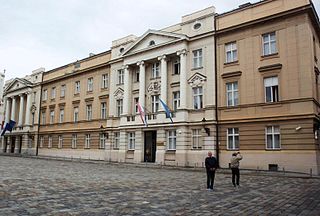
At the time of the Roman Empire, the area of modern Croatia comprised two Roman provinces, Pannonia and Dalmatia. After the collapse of the Western Roman Empire in the 5th century, the area was subjugated by the Ostrogoths for 50 years, before being incorporated into the Byzantine Empire.

The Croatian Parliament or the Sabor is the unicameral legislature of the Republic of Croatia. Under the terms of the Croatian Constitution, the Sabor represents the people and is vested with legislative power. The Sabor is composed of 151 members elected to a four-year term on the basis of direct, universal and equal suffrage by secret ballot. Seats are allocated according to the Croatian Parliament electoral districts: 140 members of the parliament are elected in multi-seat constituencies. An additional three seats are reserved for the diaspora and Croats in Bosnia and Herzegovina, while national minorities have eight places reserved in parliament. The Sabor is presided over by a Speaker, who is assisted by at least one deputy speaker.

Zachlumia or Zachumlia, also Hum, was a medieval principality located in the modern-day regions of Herzegovina and southern Dalmatia. In some periods it was a fully independent or semi-independent South Slavic principality. It maintained relations with various foreign and neighbouring powers and later was subjected to Kingdom of Hungary, Kingdom of Serbia, Kingdom of Bosnia, Duchy of Saint Sava and at the end to the Ottoman Empire.

The State of Slovenes, Croats and Serbs was a political entity that was constituted in October 1918, at the end of World War I, by Slovenes, Croats and Serbs (Prečani) residing in what were the southernmost parts of the Austro-Hungarian Empire. Although internationally unrecognised, this was the first incarnation of a Yugoslav state founded on the Pan-Slavic ideology. Thirty-three days after it was proclaimed, the state joined the Kingdom of Serbia and the Kingdom of Montenegro to form the Kingdom of Serbs, Croats and Slovenes.

Bihać is a city and the administrative centre of Una-Sana Canton of the Federation of Bosnia and Herzegovina, an entity of Bosnia and Herzegovina. It is situated on the banks of river Una in northwestern Bosnia and Herzegovina, in the Bosanska Krajina region. In 2013 its population was 56,261.

The Kingdom of Croatia-Slavonia was a nominally autonomous kingdom and constitutionally defined separate political nation within the Austro-Hungarian Empire. It was created in 1868 by merging the kingdoms of Croatia and Slavonia following the Croatian–Hungarian Settlement of 1868. It was associated with the Kingdom of Hungary within the dual Austro-Hungarian state, being within the Lands of the Crown of St. Stephen, also known as Transleithania. While Croatia had been granted a wide internal autonomy with "national features", in reality, Croatian control over key issues such as tax and military issues was minimal and hampered by Hungary. It was internally officially referred to as the Triune Kingdom of Croatia, Slavonia and Dalmatia, also simply known as the Triune Kingdom, and had claims on Dalmatia, which was administrated separately by the Austrian Cisleithania. The city of Rijeka, following a disputed section in the 1868 Settlement known as the Rijeka Addendum, became a corpus separatum and was legally owned by Hungary, but administrated by both Croatia and Hungary.

The Serbs of Croatia or Croatian Serbs constitute the largest national minority in Croatia. The community is predominantly Eastern Orthodox Christian by religion, as opposed to the Croats who are Roman Catholic.

Croatisation or Croatization is a process of cultural assimilation, and its consequences, in which people or lands ethnically only partially Croatian or non-Croatian become Croatian.
Bosniaks are a South Slavic ethnic group, native to Bosnia and Herzegovina and the region of Sandžak. The term Bosniaks was re-instated in 1993 after decades of suppression in the Socialist Federal Republic of Yugoslavia. The Bosniak Assembly adopted the ethnonym to replace "Bosnian Muslims." Scholars believe that the move was partly motivated by a desire to distinguish the Bosniaks from the fabricated and imposed term Muslim to describe their nationality in the former Yugoslavia. These scholars contend that the Bosniaks are distinguishable from comparable groups due to a collective identity based on a shared environment, cultural practices and experiences.
The Diet of Bosnia and Herzegovina, was a representative assembly with competence over the Austro-Hungarian Condominium of Bosnia and Herzegovina. The parliament established in 1910 had a certain legislative authority, however, its resolutions were subject to approval by the Austrian and Hungarian government. It ceased its operation in July 1914 and was legally abolished in 1915.
Diocese of Zadar may refer to:

The Kingdom of Croatia was part of the Lands of the Hungarian Crown, but was subject to direct Imperial Austrian rule for significant periods of time, including its final years. Its capital was Zagreb. It was also a part of the lands of the Habsburg monarchy from 1527, following the Election in Cetin, and the Austrian Empire from 1804 to 1867.

The Dragović Monastery is a Serbian Orthodox monastery situated on a hill downstream the Cetina River not far from Vrlika in Croatia. When the artificial Peruća Lake was created, the original monastery sank due to land movement. The new monastery Dragović was built on a hill not far from the previous one.

Bosnia and Herzegovina fell under Austro-Hungarian rule in 1878, when the Congress of Berlin approved the occupation of the Bosnia Vilayet, which officially remained part of the Ottoman Empire. Three decades later, in 1908, Austria-Hungary provoked the Bosnian Crisis by formally annexing the occupied zone, establishing the Condominium of Bosnia and Herzegovina under the joint control of Austria and Hungary.
Diocese of Šibenik may refer to:
Dabar (דָּבָר) is a Hebrew word that means "word", "talk" or "thing".

The Krupa Monastery is a Serbian Orthodox monastery on the Krupa River in Croatia. It is the oldest Orthodox monastery in Croatia.

Sabor Palace is a historic building in Gornji Grad, Zagreb, which houses the Croatian Parliament, called Sabor. The place first housed the initial building for the parliament of Croatia, Dalmatia, and Slavonia in 1737, and the current building got its final expansion and overhaul in 1911.












